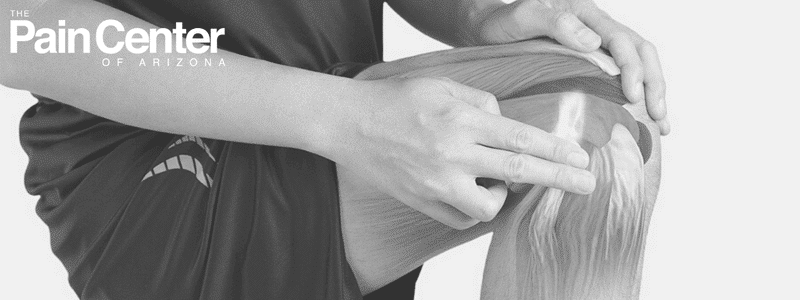
Dealing with knee osteoarthritis usually means dealing with pain and stiffness all day, but that doesn’t have to be the case. Not only are medications available to be taken by mouth, but knee injections are quickly becoming just as popular. If you are interested in injections for OA, talk to your pain management specialist at The Pain Center of Arizona to find out if it is a good option for you.
In this blog on knee injections for osteoarthritis (OA), we’ll look at the following questions:
- How do knee injections work?
- What are corticosteroid injections?
- How long does a cortisone shot last for osteoarthritis?
- What are the side effects of cortisone injections in the knee?
- How many times can you get a cortisone shot in your knee?
- What are hyaluronic acid injections?
- Does hyaluronic acid work for osteoarthritis?
- How long do hyaluronic acid injections in the knee last?
- What are the side effects of hyaluronic acid injections in the knee?
How Do Knee Injections Work?
It’s essential to understand how knee injections work. First, a doctor will inject a shot of anesthetic to numb the knee. Then, a needle may be used to draw out any extra fluid (synovial fluid) in the knee. After that, the patient will receive the pain-relieving injection, typically just below the kneecap. The drug will work throughout the joint and shouldn’t be painful.
Different treatments have side effects that patients affected by osteoarthritis should discuss with their doctor beforehand. The two most common types of knee injections include corticosteroids and hyaluronic acid.
Corticosteroid Injections
Corticosteroid injections are helpful in treating pain from knee osteoarthritis and swelling due to fluid buildup in the knee. These injections help relieve pain symptoms and reduce inflammation in the joint.
How Long Does a Cortisone Shot Last for Osteoarthritis?

Those considering this treatment should remember that they work quickly, meaning these injections offer rapid relief, usually within 24 to 48 hours. Also, the benefit is short-term. On average, the pain relief lasts 6 to 12 weeks, long enough to get patients through a flare-up of osteoarthritis until their symptoms subside.
What are the Side Effects of Cortisone Injections in the Knee?
While cortisone injections can help with knee pain, there are still additional effects that they may have on the body, including intense pain, joint swelling, and bruising. While someone may experience one or more of these side effects, they only last around a day or two following the treatment.
If you experience more severe effects of the injection, such as fever symptoms, confusion, extreme swelling in the face or limbs, chest pain, and eye problems, make sure to contact your doctor.
How Many Times Can You Get a Cortisone Shot in Your Knee?

Patients shouldn’t get cortisone injections frequently. A corticosteroid shot often works best the first time, and after that, they tend to give less relief. Patients are usually advised to use these shots two to three times a year. Using them too often may damage cells in the knee that make cartilage.
Hyaluronic Acid Injections
Most of the fluid in a healthy knee is hyaluronic acid, but the hyaluronic acid in the knee thins for those with knee OA. Hyaluronic acid acts as a lubricant to enable bones to move smoothly over each other and as a shock absorber for joint loads. Doctors can inject into the knee joint to boost the supply.
Does Hyaluronic Acid Work for Osteoarthritis?
Studies have shown that hyaluronic acid injections may help more than pain-relief medications for some people with OA. Other studies show they may improve symptoms as efficiently as corticosteroid injections do.
But patients should know that it’s often not the first approach because hyaluronic acid treatments are more expensive. They’re usually covered by insurance, however. If there’s no improved function from pain-relief medications or non-drug treatments such as physical therapy, heat, or ice, hyaluronic acid may be suggested to patients.
Patients who can’t take pain relievers such as Advil or Motrin (ibuprofen), Aleve (naproxen sodium), or Tylenol (acetaminophen) are encouraged to try hyaluronic acid injections. Hyaluronic acid injections are often used if a steroid shot doesn’t help enough or if patients and their doctors are concerned about its side effects.
How Long Do Hyaluronic Acid Injections in the Knee Last?

After an injection, hyaluronic acid helps cushion and lubricate the moving parts of the knee. This effect is short-lived, but the treatment also provides more long-term benefits by relieving pain and inflammation.
Patients may need more than one injection. Five versions of hyaluronic acid injections are available in the U.S. Some types require only one injection, while others require up to five injections, usually within five weeks. If needed, patients can get another shot after six months.
What are the Side Effects of Hyaluronic Acid Injections in the Knee?
Just like cortisone injections, hyaluronic acid injections can cause side effects. The most common effects of hyaluronic acid are swelling in the knee joint, lingering pain, and swelling. If the side effects persist over a couple of days or worsen, contact your doctor.
Published On: June 17, 2013
Updated On: March 14, 2023



